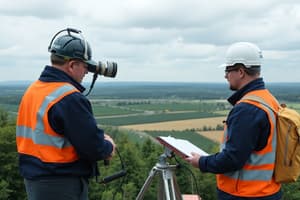Podcast
Questions and Answers
Why is studying the mineral composition of rocks important in petrology?
Why is studying the mineral composition of rocks important in petrology?
- To analyze the atmospheric conditions at the time of rock formation
- To determine the age of the rocks
- To understand the chemical processes involved in rock formation (correct)
- To study the biological history of rocks
What are the main factors responsible for the formation of metamorphic rocks?
What are the main factors responsible for the formation of metamorphic rocks?
- Biological processes
- Changes in temperature, pressure, or other environmental factors (correct)
- Radioactive decay
- Changes in chemical composition
What aspect of rocks do geologists study to understand how rocks behave under different conditions?
What aspect of rocks do geologists study to understand how rocks behave under different conditions?
- Density
- Strength, hardness, and thermal conductivity (correct)
- Color
- Texture
Why is petrology considered a critical subtopic within environmental geoscience?
Why is petrology considered a critical subtopic within environmental geoscience?
How does understanding the properties of rocks help in predicting natural hazards?
How does understanding the properties of rocks help in predicting natural hazards?
What insights can geologists gain by studying the formation, classification, and properties of rocks?
What insights can geologists gain by studying the formation, classification, and properties of rocks?
What is the scientific study of the origin, composition, and physical properties of rocks called?
What is the scientific study of the origin, composition, and physical properties of rocks called?
Which type of rock is formed from cooled and solidified magma or lava?
Which type of rock is formed from cooled and solidified magma or lava?
What tool do geologists often use in petrology to examine thin sections of rocks at a microscopic level?
What tool do geologists often use in petrology to examine thin sections of rocks at a microscopic level?
What process leads to the transformation of one rock type into another due to changes in temperature, pressure, or other environmental factors?
What process leads to the transformation of one rock type into another due to changes in temperature, pressure, or other environmental factors?
Which rock type is composed of layers of mineral, organic, or rock particles deposited by water, wind, or ice?
Which rock type is composed of layers of mineral, organic, or rock particles deposited by water, wind, or ice?
What do geologists rely on to understand rocks' properties and behavior under different conditions like heat, pressure, or chemical interactions?
What do geologists rely on to understand rocks' properties and behavior under different conditions like heat, pressure, or chemical interactions?
Flashcards are hidden until you start studying
Study Notes
Environmental geoscience is a multidisciplinary field that combines aspects of geology, ecology, and environmental science to study the Earth's natural systems and their interactions with human activities. One subtopic within environmental geoscience is the study of rocks, which is known as petrology.
Petrology, specifically, is the scientific study of the origin, composition, and physical properties of rocks. It involves understanding the processes that lead to the formation of rocks, such as magma cooling and solidifying, or the transformation of one rock type into another due to changes in temperature, pressure, or other environmental factors.
To study rocks in petrology, geologists often use a microscope called a petrographic microscope. This tool allows them to examine thin sections of rocks under high magnification, revealing the mineral composition and structure of the rock at a microscopic level. This information is crucial for understanding the rock's properties and behavior under various conditions, such as heat, pressure, or chemical interactions.
Petrology also involves the classification and description of rocks based on their mineral composition and structure. The most common rock types are igneous, sedimentary, and metamorphic. Igneous rocks are formed from cooled and solidified magma or lava, while sedimentary rocks are composed of layers of mineral, organic, or rock particles deposited by water, wind, or ice. Metamorphic rocks result from the transformation of pre-existing rocks due to changes in temperature, pressure, or other environmental factors.
In addition to understanding the formation and classification of rocks, petrology also involves studying the chemical and physical properties of rocks. For example, geologists may study the mineral composition of rocks to understand the chemical processes that led to their formation or to identify the conditions under which the rock was formed. They may also study the physical properties of rocks, such as their strength, hardness, and thermal conductivity, to understand how rocks behave under different conditions.
Petrology is a critical subtopic within environmental geoscience because rocks play a vital role in the Earth's natural systems and the processes that shape our planet. Understanding the properties and behavior of rocks is essential for predicting natural hazards, such as earthquakes and volcanic eruptions, and for managing the Earth's resources, such as minerals, energy, and water.
In summary, the study of rocks within environmental geoscience is a crucial aspect of understanding the Earth's natural systems and their interactions with human activities. By studying the formation, classification, and properties of rocks, geologists can gain valuable insights into the Earth's past, present, and future.
Studying That Suits You
Use AI to generate personalized quizzes and flashcards to suit your learning preferences.




